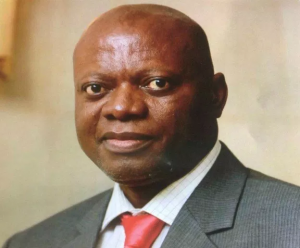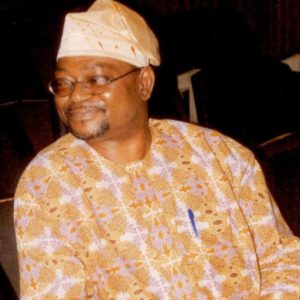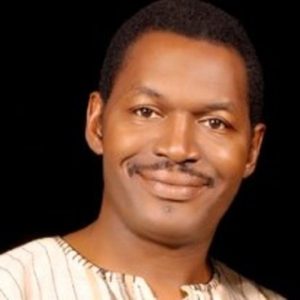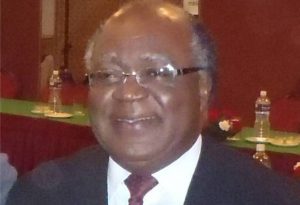By Adagbo Onoja
The nexus between knowledge and emancipation means that Professor Eghosa Osaghae’s August 22nd, 2019 Inaugural Lecture at the University of Ibadan must be acted upon journalistically. Otherwise, there is something intellectually dangerous if not suicidal in trying to report an Inaugural Lecture, about the only realm of academia where quarrelling, elegantly called critical engagement, is disallowed. The academic set on a mission of delivering an Inaugural Lecture struts in, says whatever s/he wants to say and goes away without anyone interrogating anything said. This goes against the spirit of reporting which inherently suffers from a reporter’s binoculars.

Prof Idowu Olayinka, VC, University of Ibadan
The danger is compounded in this case – reporting the Inaugural Lecture of an academic widely regarded as an Iroko in matters of scholarship on federalism on the African continent. Iroko is not an outlandish terminology here when properly contextualized. Academics do not have much regards for hierarchy but academia cannot do without hierarchy. There can be nothing wrong in calling a product of another and a taller Iroko an Iroko. Peter Ekeh who supervised Osaghae’s PhD thesis many decades ago is one of the few African scholars to have made a theoretical statement. His theory of ‘colonialism and the two publics in Africa’, especially as it applies to corruption and as might have been updated, should be enjoying the same global reference as, say, Ole Waever’s securitisation theory if not for the geopolitics of knowledge production. In any case, Osaghae has explored and also conquered so much in academia.
Lastly, dissecting a 14, 359-word Inaugural Lecture can be tedious and problematic. It is comparable in a way to Albert Camus and his task of rolling up a boulder. The references alone stretch across nine pages, 78 of which have been authored by the lecturer. The oldest text there is a 1957 book while the most recent is a 2019 text. All these details are margin error free because I counted and counted. But, does a platform by the name Intervention have a choice?
This Inaugural Lecture is a massive one, both in content and contentions. A starting point could be a crude attempt at taking apart the lecture into component parts. Something like this could emerge, not in any order: The central theme is federalism or, if you like, federalism in Nigeria. But the central theme was escorted into the arena with three points of departures. This section might not excite politicians and other members of the power elite involved in the tussle for hegemony in Nigerian politics but here resides that reason the academic community in Nigeria might end up apologizing to the Department of Political Science at the University of Ibadan for always referring to it as foundationalist and empiricist oriented in scholarship. The Marxist and the post – positivist voices were louder in Osaghae’s articulation of the points of departure than that of a product of a Department stuck with foundationalism. It would not be anything strange if such an apology is demanded and tendered at a time the world is profusely apologizing to Prof Kenneth Waltz for misreading his Theory of International Politics as a text in positivism rather than in analyticism. The next component would be Osaghae’s self-location in the legacy of social and political sciences at the University of Ibadan. It is debatable but this where the most controversial statement in the entire lecture can be found in another variant of the thesis of leadership as ‘the trouble with Nigeria’. There is, lastly, the biodata section which, when situated, conveys its own message.
The attempt here is how to dash through all the segments in a largely journalistic piece that should not be too long. Beginning with Osaghae’s self-location in a legacy of social and political sciences peculiar to Ibadan, the argument here is that there is the Ibadan School of Political Science, of which he is a product and disciple and for which “the state, its pathologies and remediation, has been the major preoccupation, its major distinction being the emphasis on the primacy of the social foundations of the state”. Pursuing this further, Osaghae says Political science at Ibadan has been distinguished by its focus on the state from the prism of its social foundations, a claim he tenders the evidence in the works of the big names in Ibadan Political Science scholarship on whose shoulders he proclaims himself standing: EU Essien-Udom, Billy Dudley, Peter Ekeh, Omo Omoruyi, John Ayoade, Busari Adebisi, Bolaji Akinyemi, Oyeleye Oyediran, Bayo Adekanye, Okon Udokang, Tunde Adeniran, Alex Gboyega, Richard Joseph, Femi Otubanjo, Adigun Agbaje, Kunle Amuwo, OBC Nwolise, Bayo Okunade, Jinmi Adisa, Jimi Adesina, Rotimi Suberu, Ade Isumonah, Remi Aiyede, Wale Adebanwi, Deolu Akande, Ronke Oyewumi, Funke Okoome and Patricia Williams, all of whom he credits with major contributions to the understanding of the maze that is African social formations and statehood.

Prof Adigun Agbaje, a symbol of the reigning generation of the Ibadan School of Political Science

Prof Emmanuel Aiyede, a symbol of the in-coming generation of the Ibadan School of Political Science
His own ‘Ibadanness’ he further locates in an experiment by the University of Ibadan of which he and a few others such as Prof Adigun Agbaje were part. The experiment was to produce homegrown scholars whose intellectual outputs and achievements today is said to bear out the experiment and which he would want to be saved from the likely threat to it by the parlous state of tertiary education in contemporary Nigeria. Many at the Ahmadu Bello University, Zaria who do not already know about this would find the information interesting because it means the two universities were pursuing similar strategies of knowledge decolonization, in the case of Zaria, by sending out nearly a dozen of its best and brightest to pursue PhD in specific spheres of knowledge. It would not be surprising if a similar thing took place at the University of Nigeria, Nsukka.
Similarly revealing is the idea of an Ibadan School of Politics. Ibadan School of History is well known in Nigeria, well outside academia. But not Ibadan School of Politics, comparatively speaking. What might have happened?
As the lecture wore on, Osaghae as a product of the Ibadan School of political Science acknowledges the continental and global sources of inspiration and support from academics he calls his seniors and mentors. Again, it is a long list: Bayo Adekanye, Moyibi Amoda, Richard Joseph, Adele Jinadu, Obaro Ikime, Godwin Sogolo, Fola Aboaba, Godwin Emerole, Mahmood Mamdani, Thandika Mkandawire, Georges Nzongola-Ntalaja, Ibbo Mandaza, Michael Vickers, Michael Dwyer, William Zartman, Crawford Young, Larry Diamond, and the late Omafume Onoge, Bade Onimode, Tekena Tamuno and Onigu Otite; my collaborators and friends, Harry Garuba, Julius Ihonvbere, John Gaventa, Rajesh Tandon, Katrin Flikschuh, Mirjam de Bruijn, Bayo Olukoshi, Ebere Onwudiwe, Uyilawa Usuanlele, Tunde Lawuyi, Rajiv Erasmus, Benson Osadolor, Wale Albert, Cyril Obi, Pita Agbese, Tiyambe Zeleza, Attahiru Jega, Stephen Ndegwa, John Mbaku, Said Adejumobi, Jacqueline Farris, and the late Masipula Sithole, TK Biaya, and Abubakar Momoh; my protégé, the revolutionary scholar, Lwazi Siyabonge Lushaba “and several others with whom we have shared the goal of making a difference in the field of comparative politics as it relates to Africa”.

Prof Isawa Elaigwu, a pioneer scholar of Federalism in Nigeria

Prof Adele Jinadu, another of the pioneer scholars of Federalism in Nigeria
This stretches further to his thankfulness to several institutions that gave him platform to thrive: University of Ibadan, Bayero University Kano, Ogun State University, now Olabisi Onabanjo University, University of Liberia, University of Cape Town, University of Transkei, now Walter Sisulu University, Emory University, Northwestern University, Nordic Africa Institute, Council for the Development of Social Science Research in Africa, CODESRIA, Rockefeller Foundation, Ford Foundation, MacArthur Foundation, French Institute for Research in Africa, IFRA, British Council, University of Cambridge, Igbinedion University Okada, the Institute of Commonwealth Studies which offered him the Emeka Anyaoku Visiting Chair of Commonwealth Studies and the platform to deliver the very first Inaugural Lecture by a Nigerian in the history of the University of London in April 2014.
Then, singling out the Faculty of Social Sciences at Ibadan, Osaghae argues that they have pursued the social science enterprise there in interesting ways – by interrogating largely unexplored and hidden underbrushes of human behaviour. They have done this, according to him, through theoretical formulations which proceed from the epistemological lenses of scepticism and distantness from the subject of study.
And then came the big story: how the Ibadan School of Political Science is the original author of the idea that the trouble with Nigeria is leadership without vision. He traces this to the late Prof Essien Udosen Essien-Udom whom he introduced as “the distinguished authority on the intriguing nexus among (Black) nationalism, identity politics and state-building, and founding father of the Ibadan School of Political Science. According to Osaghae, Essien-Udom who later became Vice-Chancellor of the University of Maiduguri, had attributed the travails of Nigeria’s First Republic to the politics without vision of the country’s leaders in a 1965 publication.
What this means is a much earlier thinking on this theme than as derived from a more recent work, Politics Without Vision: Thinking Without a Banister in the Twentieth Century by Tracy Strong, a UK based political theorist. Hence, Osaghae says “In the Nigerian case, the leaders were not thinkers without a banister; they were rather thinking with the wrong banisters because, as I argue shortly, their thinking on the Nigerian state was blighted by simultaneous “thinking” on the component units which mattered more to them. In the end, the state was and remains the greatest casualty, crippled, as it were, from birth”. This quotation is part of an argument he has already developed in a book.
It is not really a controversial statement but rather interesting on two points. The first is the position that the idea of the devastating consequences of politics without vision is not a recent creation but something that Ibadan has the patent. The second is that Ibadan didn’t assert itself at all in all these years that leadership as “the trouble with Nigeria” seized the paradigmatic high ground when all two are saying the same thing. Again, what happened?
Perhaps, the second segment of this review might have the answer where we get to the heart of the lecture- federalism in Nigeria!




























